Related Research Articles
Neo-fascism is a post-World War II far-right ideology that includes significant elements of fascism. Neo-fascism usually includes ultranationalism, ultraconservatism, racial supremacy, right-wing populism, authoritarianism, nativism, xenophobia, and anti-immigration sentiment, sometimes with economic liberal issues, as well as opposition to social democracy, parliamentarianism, Marxism, capitalism, communism, and socialism. As with classical fascism, it occasionally proposes a Third Position as an alternative to market capitalism.
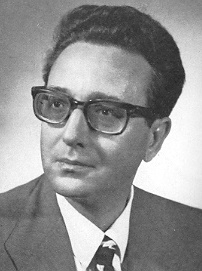
Giuseppe Umberto "Pino" Rauti was an Italian neo-fascist politician who was a leading figure of the Italian far-right for many years. Involved in active politics since 1948, he was one of founders and for many years the leader of the Italian Social Movement (MSI). He was the main representative of the MSI's radical faction until the party dissolution in 1995.
Terza Posizione was a short-lived neo-fascist political movement founded in Rome in 1978. The group published a journal, also called Terza Posizione which promoted Third Position politics. It was formed by teenagers and students from a previous group called Lotta Studentesca.
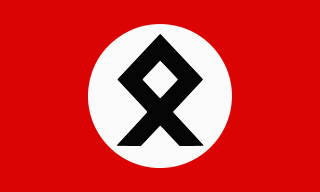
The National Vanguard is a name that has been used for at least two neo-fascist and neo-Nazi groups in Italy.

Stefano Delle Chiaie was an Italian neo-fascist terrorist. He was the founder of Avanguardia Nazionale, a member of Ordine Nuovo, and founder of Lega nazionalpopolare. He went on to become a wanted man worldwide, suspected of involvement in Italy's strategy of tension, but was acquitted. He was a friend of Licio Gelli, grandmaster of P2 masonic lodge. He was suspected of involvement in South America's Operation Condor, but was acquitted. He was known by his nickname "il caccola" as he was just over five feet tall - although he stated that originally, the nickname came from his very young involvement, at age 14, in the Italian Social Movement (MSI), a neo-fascist political party established after the war.
Ordine Nuovo was an Italian far right cultural and extra-parliamentary political and paramilitary organization founded by Pino Rauti in 1956. It had been the most important extra-parliamentary neofascist organization of the post-war Italian republic.

A strategy of tension is a political policy wherein violent struggle is encouraged rather than suppressed. The purpose is to create a general feeling of insecurity in the population and make people seek security in a strong government.

Giorgio Almirante was an Italian politician who founded the neo-fascist Italian Social Movement, which he led until his retirement in 1987.
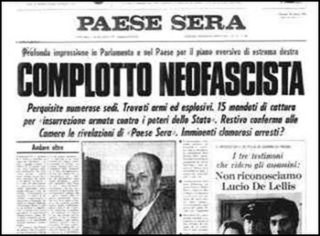
The Golpe Borghese was a failed Italian coup d'état allegedly planned for the night of 7 or 8 December 1970. It was named after Junio Valerio Borghese, wartime commander of the Decima Flottiglia MAS and a hero in the eyes of many post-War Italian fascists. The coup attempt became publicly known when the left-wing journal Paese Sera ran the headline on the evening of 18 March 1971: Subversive plan against the Republic: far-right plot discovered.

The Nuclei Armati Rivoluzionari, abbreviated NAR, was an Italian neo-fascist armed militant organization active during the Years of Lead from 1977 to November 1981. It committed over 100 murders in four years, and had planned to assassinate the politicians Francesco Cossiga, Gianfranco Fini and Adolfo Urso. The group maintained close links with the Banda della Magliana, a Rome-based criminal organization, which provided such logistical support as lodging, false papers, weapons, and bombs to the NAR. In November 1981, it was discovered that the NAR hid weapons in the basements of the Health Ministry. The first trial against them sentenced 53 people in May 1985 on charges of terrorist activities.

Franco "Giorgio" Freda is one of the leading neo-Fascist intellectuals of the post-war Italian far-right. He founded a publishing house for neo-Nazi thought, and described himself as an admirer of Hitler. He was convicted but later acquitted for lack of evidence for involvement in the Piazza Fontana bombing. He founded the Fronte Nazionale, which was disbanded by the Italian government in 2000 when Freda and forty-eight other members were found guilty of attempting to re-establish the National Fascist Party.
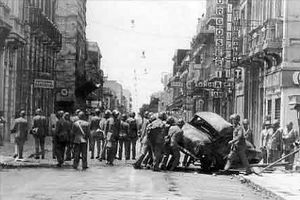
The Reggio revolt occurred in Reggio Calabria, Italy, from July 1970 to February 1971. The cause of the protests was a government decision to make Catanzaro, not Reggio, regional capital of Calabria. The nomination of a regional capital was the result of a decentralization programme of the Italian government, under which 15 governmental regions were concretized and given their own administrative councils and a measure of local autonomy.
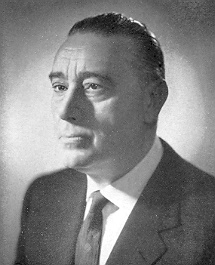
Arturo Michelini was an Italian politician and secretary of the Italian Social Movement (MSI). A minor party official during the days of Italian fascism and a war veteran, Michelini emerged as one of the two leading figures in the MSI during the 1950s and 1960s, representing the moderate tendency of the party against the nostalgic fascist tendency.
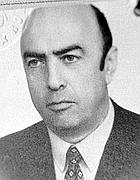
Aldo Semerari was an Italian criminologist, anthropologist and psychiatrist. He was also a noted neo-fascist, who was suspected of complicity in the terror attack that killed 85 people at Bologna railway station in 1980.
Secolo d'Italia is a daily online newspaper in Italy, published since 1952, formerly supporting neo-fascism. In 2012, it ceased its print edition and continued as an online-only conservative publication.

The Italian Social Movement was a neo-fascist political party in Italy. A far-right party, it presented itself until the 1990s as the defender of Italian fascism's legacy, and later moved towards national conservatism. In 1972, the Italian Democratic Party of Monarchist Unity was merged into the MSI and the party's official name was changed to Italian Social Movement – National Right.
Post-fascism is a label that identifies political parties and movements that transition from a fascist political ideology to a more moderate and mainline form of conservatism, abandoning the totalitarian traits of fascism and taking part in constitutional politics.
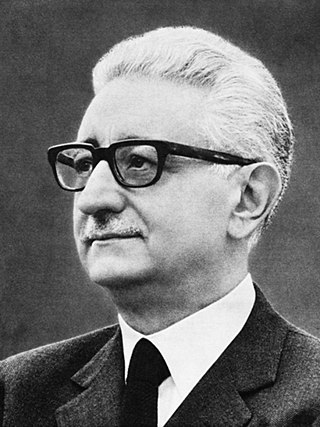
The 1971 Italian presidential election was held in Italy on 9–24 December 1971.
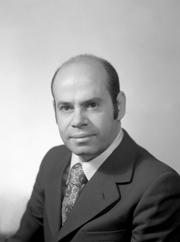
Francesco Franco, also known as Ciccio Franco, was an Italian politician, trade unionist and activist. He was a senator for the Italian Social Movement – National Right (1972–1991). He gained particular notoriety for his role as a popular leader during the Reggio revolt of 1970–1971.
Pierluigi Concutelli, known as The Commander, was an Italian neofascist, terrorist, and bank robber. He styled himself as an "urban guerrilla fighter". He was a member of the far-right organization Ordine Nuovo, and later became the leader of its underground armed unit, Gruppi di Azione Ordinovista.
References
- ↑ Panorama. Mondadori. 1975. p. 384.
- 1 2 Franco Ferraresi, Threats to Democracy: The Radical Right in Italy After the War, Princeton University Press, 1995p. 117
- 1 2 3 Ferraresi, Threats to Democracy, p. 118
- ↑ L. Cheles, R. Ferguson & M. Vaughan (eds.), Neo-Fascism in Europe, Harlow: Longman, 1992, p. 36